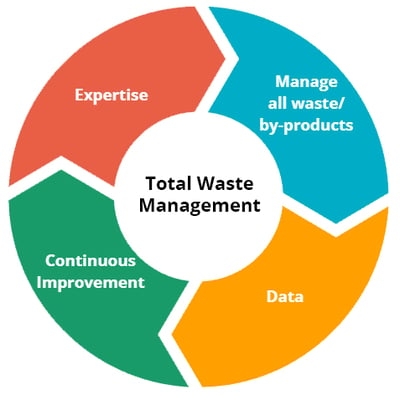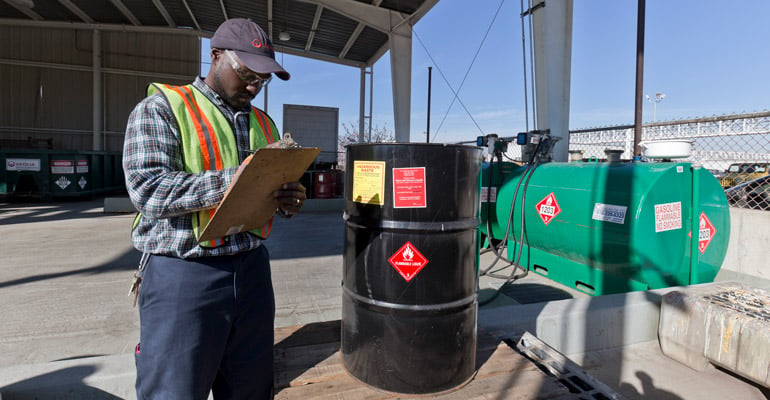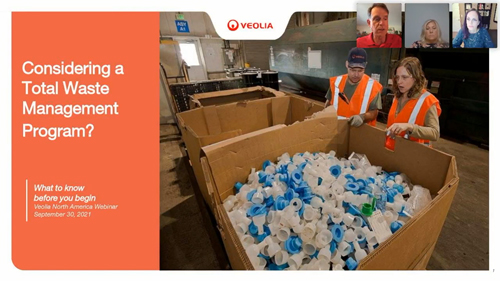When we refer to total waste management (TWM), we are describing a comprehensive solution for all of the waste from a business. It’s a program driven by multiple objectives, from reducing waste to disposing of it in a sustainable way to creating new revenue streams from it. In essence, total waste management refers to a relationship in which your waste partner handles all of your hazardous and non-hazardous waste streams under one contract thought a single point of contact.
What total waste management is not
- Isn't driven by one primary factor
- Doesn't break up waste into separate scopes of work
- It generally doesn't use multiple waste suppliers
- Doesn't mean evaluating thousands of individual waste items
How total waste management works

When you implement a total waste management program, you’re looking for one waste partner that can manage every single piece of waste or byproduct your business produces. They handle everything from plant generated solid waste to the most hazardous material that you generate.
Manage all waste and byproducts
Recycling, solid waste disposal, hazardous/non-hazardous, medical waste, universal wastes, and associated equipment. While program management is included, optional items can include labor and logistics to properly collect, store, and transport waste.
Consolidated waste data
Allows you to understand where your operation currently is in terms of waste produced, your waste streams, quantities reused or recycled currently, what you spend on waste management, and more.
Total waste management consolidates all that data in one place, so your team doesn’t need to spend time pulling data from many different sources. This consolidation makes it easier to track how well you’re meeting your waste goals.
Continuous improvement
Companies can focus on their core business while their partner works on reducing their waste, ensuring regulatory compliance, finding beneficial reuse options, and lowering the total cost of ownership for waste.
Achieving continuous improvement goals involves complicated processes that the waste generator may not have the specific expertise in, but their partner does.
Expertise
A waste partner is an expert in compliance, how to reuse waste and byproducts, and the latest waste management technology. They fill in the gaps in your operation and have the knowledge to take your waste from generation to final disposal while adhering to regulatory compliance requirements.
The benefits for your business

The primary benefit of total waste management is that it takes a very important and potentially time consuming part of your business off your plate. It simplifies waste programs, which reduces the resources you and your employees spend on tracking shipments, processing invoices, physically managing the waste, and maintaining compliance.
In addition, having a single point of contact for all your waste needs greatly cuts back on the amount of time dealing with multiple vendors. With total waste management, you have one company to talk to, one company responsible if something goes wrong, and one company to build a successful relationship with.
Your waste partner’s expertise makes it much easier to meet your company’s sustainability goals. They will analyze your waste streams and find opportunities for recycling, recovery, landfill diversion, and alternative beneficial reuse solutions. These opportunities will often help to reduce your costs because less of the byproducts you produce will be disposed of as waste. Recovery and reuse options have the potential to limit your need for new resources and to open up new revenue streams.
How to get started
In order to start exploring a total waste management program, we recommend the following steps:
- Build a majority consensus with major stakeholders to determine the direction and scope of your program
- Gather waste data to understand your starting point or “baseline"
- Develop a scope of work for your TWM partner
- Identify the terms and conditions (payment terms, length of contract, timeline, etc.)
- Determine whether you allow site visits to receive more detailed proposals
- Complete your contractual homework to determine whether you can terminate agreements with existing waste providers
Total waste management is the fastest way to simplify your waste operation, meet sustainability and reduction goals, ensure compliance, extract value from waste byproducts, and lower your costs.
If you'd like to learn how to get started, check out our total waste management webinar.


